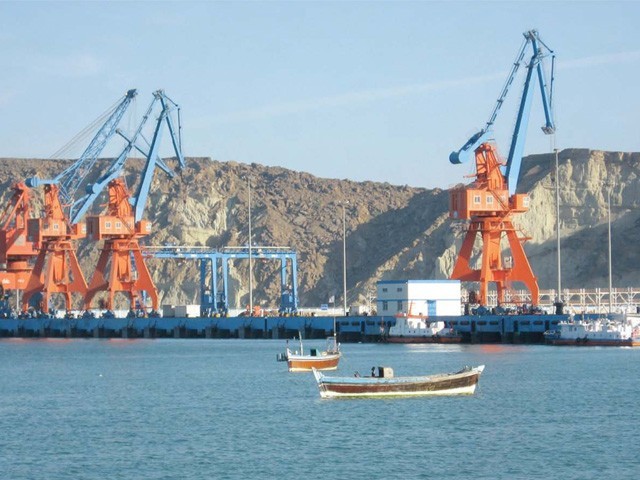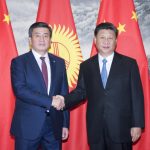by Alia Ahmed
By a strange quirk of history, a small, quiet fishing town lies at the heart of one of the most ambitious development projects for regional integration in Asia: the China-Pakistan Economic Corridor (CPEC). Gwadar, located in Pakistan’s slighted southwestern province of Balochistan, is as arid as it is thirsty. There, drinking water holds more value than money. Gwadar is mineral-rich but dirt poor, and the schools and healthcare facilities that service its 85,000 residents are few and decrepit. It is a far cry from Dubai or Singapore, into which officials hope, in time, to transform the ancient locale.
CPEC’s core initiative is the creation of a vast network of rail, highway, and pipeline projects that will run the length of Pakistan, connecting Gwadar Port (a multi-billion-dollar deep-sea port contracted to the Chinese in 2013) to the city of Kashgar, in China’s western Xinjiang province. A cornerstone of China’s “One Belt, One Road” scheme, the route would thus link China to its markets in Asia, Africa, and Europe. Numerous power and infrastructure projects across Pakistan, to the great benefit of the energy-starved nation, bring investment under CPEC to an extraordinary $51.5 billion. However, as noted in a 2015 report by economic advisor to the chief minister of Balochistan government, Kaiser Bengali, “The main substance of the Corridor is the Gwadar port and the Gwadar-Kashgar highway; the rest is icing on the cake.”
However, the all-important highway must pass through Balochistan, where decades of neglect and mismanagement have led to a legitimate nationalist movement, but also a violent insurgency comprised of various separatist and sectarian militant outfits. Baloch alienation stems from concerns that the federal government exploits the province’s plentiful gas and mineral reserves for the benefit of Punjab, Pakistan’s largest and most populous province, and also the power base of the country’s ruling elite. The country’s military and intelligence establishment, in turn, brutally suppresses dissent—“a grim chronology of deaths and [enforced] disappearances,” in the words of an April 2016 editorial in Dawn, Pakistan’s leading English-language daily. Between 2011 and 2014 alone, some 800 bodies had been recovered across Balochistan. Militants are staunchly opposed to CPEC, viewing foreign investment as an infringement on their land. But locals aren’t pleased either.
In particular, Gwadar’s original community of fishermen face threats to their livelihood. They complain that work on CPEC has encroached on their land and fishing zones. Locals have reportedly said that they frequently see notices banning fishing near Gwadar Jetty, the center of their trade, for up to 24 hours or more at a time. “My ancestors were fishermen like me. We have been living here for centuries,” fisherman Rasool Bakhsh told The Diplomat in August:
These days, most of the time I see a ban on fishing around the port for security reasons, as well as restrictions put in place by construction. I have a small boat but I can’t go to out to sea to fish. In my boat there are seven people working, which means seven families are dependent on fishing. There are hundreds of small boats in Gwadar like mine. I wonder how I will feed my family if I am kicked off of Gwadar jetty as I have been hearing will soon happen. They say that fishermen will not be allowed to use it when the port becomes completely operational. Will I be helped or will my children get jobs in Gwadar? I often worry about this.
On paper, CPEC promises to create thousands of jobs, upgrade crumbling infrastructure, and alleviate the energy and water crisis in Balochistan and the country as a whole. Indeed, when construction on Gwadar Port first began in the early 2000s, the nationalist leadership in Balochistan supported the plans. Now locals are doubtful of what they will gain from the flurry of economic activity. “The suspicion is that all the Baloch will get from CPEC is the right to repair punctures on Chinese tires,” The Guardian quoted Bengali early this year.
The Chinese presence in Gwadar has turned the once-drowsy fishing town into what journalists have called a “fortress.” Checkpoints, guarded convoys, and expanded police and military presence now protect Chinese workers and investment in Gwadar. “For the locals it’s like being a prisoner in your own town,” a retired army officer said in the same Guardian article. More generally, the government announced two months ago that it had set up a security division of 15,000 troops, comprising both military and paramilitary personnel, to protect CPEC projects currently underway. Gwadar’s relatively remote location has largely spared it from the excesses of Balochistan’s insurgency. But in such a highly militarized environment, should Chinese workers or investment be harmed, locals may suffer collective punishment for the misdeeds of a few.
CPEC has not created any new problems. It has only shed light on the issues that have always plagued Pakistan, namely, the battle of the smaller provinces against Punjab, often considered the heart of Pakistan. Baloch apprehensions that Punjab will snatch up all the prosperity that CPEC promises to bring were inflamed when controversy broke out over the actual route that the Gwadar-Kashgar corridor (“the icing on the cake”) would traverse. The original route, proposed in 2006, was later altered so that it would pass mostly through Punjab, thus avoiding violent and unstable parts of Balochistan and the northern province of Khyber Pakhtunkhwa. Naturally, the move stoked the ire of lawmakers there. Another great fear is that the Baloch would become a minority in their own province, as Chinese and Pakistani workers from the rest of the country, especially Punjab, come to Balochistan to work on CPEC projects. The route controversy, at least, appears to have died down, though at a seminar this past July in Islamabad, former president of the Supreme Court Bar Association Asma Jahangir reiterated, “Looting Balochistan and spending it in Lahore [in Punjab] is not development at all.”
Approached fairly, CPEC could be a boon not only to Pakistan but to regional cohesion as a whole. The age-old concerns CPEC underscores only highlight the necessity to address the deeper sources of provincial discontent in Pakistan. Islam has failed to unify a disparate people. Could this be an opportunity to start over?
As these squabbles play out on the national stage, the Gwadar fishermen, meanwhile, are increasingly marginalized. There is little room for them in today’s world of steel, technology, and gleaming port cities. A fisherman innocently told a journalist this summer, “Development is good, China is our great friend, this CPEC thing sounds amazing, but don’t forget that this is our land first.”
Photo: Gwadar port






Very disappointing article ,lbbies. i flawed research and